Rulers
Index Q
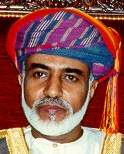
Qabus |
Qabus ibn Sa`id, also spelled Qaboos bin Said (b. Nov. 18, 1940, Salalah, Muscat and Oman [now Oman] - d. Jan. 10, 2020, Muscat, Oman), sultan of Oman (1970-2020). He was educated in England at Bury Saint Edmunds, Suffolk, and at Sandhurst, the Royal Military Academy, in Berkshire. He was called home in 1964 by his father, Sa`id ibn Taimur, who kept his son a virtual prisoner while maintaining his subjects in a state of medieval backwardness despite the country's growing oil revenues. In 1970 Qabus took over the palace in a bloodless coup with British support and exiled his father. He immediately undertook a range of ambitious modern development projects, including the construction of roads, hospitals, schools, communications systems, and industrial and port facilities. He abrogated his father's moralistic laws and established a cabinet and a system of municipal councils. After initially sharing power with his uncle Tariq ibn Taimur, in 1972 Qabus took over the duties of the prime minister himself. His regime faced such problems as labour unrest, fiscal instability, a shortage of technocrats, and a rebellion in the southern region of Dhofar which he succeeded in suppressing in 1975. He moved the country out of its isolation by joining the Arab League and the United Nations in 1971 and helping form the Gulf Cooperation Council in 1981. He aligned Oman with the moderate Arab powers. In 1981 he created the State Consultative Council, superseded in 1991 by the Consultative Council. Omanis from outside the royal family, including women, were gradually allowed to participate in the government. In 1996 he issued a "Basic Law," Oman's first written constitution. In 2002 he extended voting rights to all citizens over the age of 21.

Qaddafi |
Qaddafi, Muammar (Muhammad Abdul Salam Abu Minyar) al-, also spelled Muammar Khadafy, Moammar Gadhafi, Mu`ammar al-Qadhdhafi, etc. (b. June 1942, Qasr Abu Hadi, near Surt, Libya - d. Oct. 20, 2011, in or near Surt), Libyan leader. He early began plotting to overthrow the Libyan monarchy. He graduated from the Libyan military academy in 1965 and thereafter rose to the rank of captain. With the help of his fellow army officers, he seized control of the government in a coup that deposed King Idris I in 1969. He was named commander in chief of the armed forces and chairman of the new Revolutionary Command Council; in 1970-72 he was also prime minister. In 1970 he removed the U.S. and British military bases from Libya and in 1973 he nationalized all foreign-owned petroleum assets. A strong proponent of Arab nationalism, he made persistent but unsuccessful attempts to unify Libya with other Arab countries and was adamantly opposed to negotiations with Israel. His government also was implicated in several abortive coup attempts in Egypt and The Sudan, and Libyan forces persistently intervened in the civil war in Chad. He espoused a form of Islamic socialism which he expressed in The Green Book (2 vol., 1976, 1980). He resigned his position as head of state in 1979 but nevertheless remained the undisputed leader. Becoming known for his erratic and unpredictable behaviour on the international scene, he financed a broad spectrum of revolutionary groups worldwide and was believed to be involved in the downing of a passenger jet over Lockerbie, Scotland, in 1988. These activities resulted in UN and U.S. sanctions against Libya. In April 1986 U.S. warplanes bombed Tripoli and Benghazi, killing his adopted daughter, wounding several other of his children, and narrowly missing Qaddafi himself. After he agreed in 2003 to abandon Libya's weapons of mass destruction program, the U.S. lifted most of its sanctions in 2004. In 2009-10 he was chairman of the African Union. In February 2011 a major rebellion against his regime broke out, and he lost control of eastern Libya. Western powers intervened on the side of the rebels, killing his son Saif al-Arab in one bombing attack. In June the International Criminal Court issued an arrest warrant for him on charges of crimes against humanity. The rebels took control of Tripoli in August, effectively ending his 42-year rule; he was captured and killed in October.
Qaddafi, Wanis al- (b. Nov. 22, 1922, Benghazi, Cyrenaica [now in Libya] - d. Dec. 1, 1986, Switzerland), foreign minister (1962-63, 1968) and prime minister (1968-69) of Libya. He was also head of the Executive Council of Cyrenaica (1952-62), minister of the interior (1963-64), labour and social affairs (1964), and planning and development (1965-68), and ambassador to West Germany (1964-65).
Qadi, Nayef (Saud) al- (b. 1944, Hawsha, near Mafraq, Transjordan [now Jordan]), interior minister of Jordan (1998-2000, 2009-10). He was also ambassador to Qatar (1989-93) and Egypt (1993-94).
Qadir, Abdul (b. 1944, Herat province, Afghanistan - d. April 22, 2014, Kabul, Afghanistan), chairman of the Military Council (1978) and defense minister (1978, 1982-84) of Afghanistan. He was also ambassador to Poland (1986-88).
Qadir, Manzoor (b. Nov. 28, 1913, Lahore, Pakistan - d. Oct. 12, 1974, London, England), foreign minister of Pakistan (1958-62).
Qahhorzoda, Fayziddin (Sattor) (b. Aug. 5, 1971, Vose district, Tadzhik S.S.R.), finance minister of Tajikistan (2018- ). He was also chairman of the State Committee for Investments and State Property Management (2017-18).
Qalibaf, Mohammad Baqer (b. Aug. 23, 1961, Torqabeh, Khorasan [now in Razavi Khorasan], Iran), Iranian politician. He has been a presidential candidate (2005, 2013), mayor of Tehran (2005-17), and speaker of parliament (2020- ).
Qamar, Syed Naveed (b. Sept. 22, 1955, Karachi, Pakistan), finance minister (1996, 2008) and defense minister (2012-13) of Pakistan. He was also minister of privatization (1996, 2008-09), petroleum and natural resources (2009-11), and water and power (2011-12).
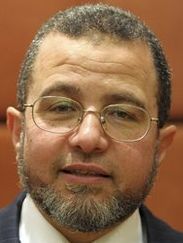
Qandil |
Qandil, Hisham (b. Sept. 17, 1962), prime minister of Egypt (2012-13). He was also minister of water resources and irrigation (2011-12).
Qanuni, Yunus (b. 1957, Panjshir district, Parwan province, Afghanistan), interior minister (1996, 2001-02) and vice president (2014) of Afghanistan. He was also minister of education (2002-04) and speaker of the National Assembly (2005-10). He was a presidential candidate in 2004.
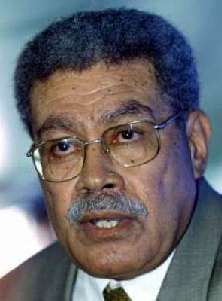
Qarase |
Qarase, Laisenia (b. Feb. 4, 1941, Mavana village, Lau islands, Fiji - d. April 21, 2020, Suva, Fiji), prime minister of Fiji (2000-01, 2001-06). He joined the civil service in 1967 and held posts including registrar of cooperatives (1976-78), deputy secretary of finance (1978-79), permanent secretary of commerce and industry (1979-80), and secretary of the Public Service Commission (1980-83). He then became head of the Fiji Development Bank (1983-97) and also held many directorships in the private sector. In July 2000 he was named as head of an interim civilian government by the Fiji Military Forces commander, Commodore Voreqe Bainimarama, who had taken power in a coup in May. After a Court of Appeal ruling on March 1, 2001, that his government was illegal, he offered his resignation on March 7 but was reappointed by Pres. Ratu Josefa Iloilo on March 16. He founded the United Fiji Party (Soqosoqo Duavata ni Lewenivanua; SDL) in May 2001, and it won a majority in the August-September elections. However, he ignored a constitutional requirement to include the second-placed party, i.e. the Fiji Labour Party of deposed prime minister Mahendra Chaudhry, in the cabinet. In the next elections, in May 2006, he won another majority, but he was deposed when Bainimarama led another coup in December. In 2012 he was sentenced to a year in jail for corruption, after being found guilty of nine charges involving the abuse of office and failure in discharging his duty when he served as director of a government investment company in 1992-95.
Qasim, Marwan al- (b. May 12, 1938, Amman, Transjordan [now Jordan]), foreign minister of Jordan (1980-84, 1988-91). He was also minister of supply (1976-79) and chief of the royal court (1984-88, 1995-96).
Qasim, Syed Mir (b. August 1921, Doru village, Anantnag district, Jammu and Kashmir, India - d. Dec. 12, 2004, New Delhi, India), chief minister of Jammu and Kashmir (1971-75). Qasim, who joined politics in the late 1940s as a member of the Constituent Assembly that drew up independent India's constitution, is considered the founding father of the Congress party in Kashmir. He was a member of the first Constituent Assembly of Jammu and Kashmir (1951-57) and held a ministerial post for three terms (1953-57, 1961-63, 1964-65). He took over as chief minister in 1971 following the death of Ghulam Mohammad Sadiq. He paved the way for the Indira-Sheikh accord between then prime minister Indira Gandhi and then Kashmir chief minister Sheikh Mohammad Abdullah in 1975 by stepping down despite having a two-thirds majority in the assembly. Qasim was a member of the Rajya Sabha from July 1975 to November 1978. He joined the union cabinet in June 1976 as minister of civil supplies and held the charge until 1977. He remained a member of the Congress (I) high command until September 1983.
Qasimi, Fahim ibn Sultan al- (b. 1948), secretary-general of the Gulf Cooperation Council (1993-96). He was also the United Arab Emirates' permanent representative to the United Nations (1980-84) and minister of economy and commerce (1997-2004) and Supreme Council and Gulf Cooperation Council affairs (2004-06).
Qa`ud, Abdul Majid al-, Arabic `Abd al-Majid al-Qa`ud (b. 1943, Ghariar, Libya), secretary of the General People's Committee of Libya (1994-97).
Qaysi, Riyadh (Mahmoud Sami) al- (b. Feb. 20, 1939, Baghdad, Iraq), Iraqi diplomat. He was permanent representative to the United Nations (1982-85).
Qazi Mohammad (bin Ali) (b. 1901 - d. [hanged] March 30, 1947, Mahabad, Iran), president of Iranian Kurdistan (1946). He was the first president of the Iranian Kurdistan Democratic Party (linked to the Iraqi KDP).
Qazzaz, (Muhammad) Said al- (b. c. 1903 - d. [executed] Sept. 20, 1959, near Baghdad, Iraq), interior minister of Iraq (1953-54, 1954-57, 1958). He was also minister of social affairs (1952-53, 1953).
Qetu, John Still Tari (b. July 7, 1983), justice minister of Vanuatu (2022- ).
Qhobela, (Matlejane James) Molapo (b. March 25, 1933 - d. Oct. 11, 2014, Maseru, Lesotho), foreign minister of Lesotho (1993-94, 1994-95). He was also minister works, transport, post and telecommunications (1995) and justice, human rights, and law and constitutional affairs (1995-96). In 1997-2000 he was leader of the Basotho Congress Party.
Qi Xieyuan (b. April 28, 1885, Ninghe, Hebei, China - d. [executed] Dec. 18, 1946, Nanjing, China), military governor of Jiangsu (1920-24).
Qian Nengxun (b. 1869, Jiashan, Zhejiang, China - d. June 5, 1924, Beijing, China), interior minister (1917-19) and premier (1918-19) of China. In the late Qing dynasty, he served as an officer in the ministry of punishment, then held gubernatorial posts in Guangxi and Shaanxi provinces. He mainly worked in the ministry of the interior after the founding of the republic.
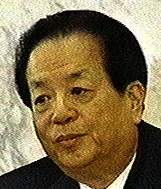
Qian Qichen |
Qian Qichen (b. Jan. 5, 1928, Jiading, Shanghai, China - d. May 9, 2017, Beijing, China), foreign minister of China (1988-98). He was also ambassador to Guinea (1974-76) and a vice premier (1993-2003).
Qianlong (era name; Wade-Giles Ch'ien-lung), personal name Hongli, temple name Gaozong, posthumous name Chun huangdi (b. Sept. 25, 1711, Beijing, China - d. Feb. 7, 1799, Beijing), emperor of China (1735-96). He succeeded his father, the Yongzheng emperor, to become the fourth emperor of the Qing dynasty. Under his vigorous military policy, China attained its maximum territorial expanse; Xinjiang in the west was conquered, and Burma and Annam in the south were forced to recognize Chinese suzerainty. He restricted Western merchants to Guangzhou in 1759, and he rejected British overtures for expanded trade and diplomatic ties in 1793. He was a patron of scholarship and the arts; some of China's finest porcelain and cloisonné were produced for his collections, and the great 36,000-volume imperial manuscript library (Siku Quanshu) was compiled under his sponsorship. Despite the surface splendor of cultural achievement and imperial expansion, his reign - one of the longest in Chinese history - became characterized in later years by growing official corruption, loss of military efficiency, and fiscal imbalance. Out of respect for his grandfather, the Kangxi emperor, he abdicated in 1796 before reaching the 61 years of Kangxi's reign; however, he held real power until his death.
Qiao Guanhua (Pinyin), Wade-Giles Ch'iao Kuan-hua (b. March 28, 1913, Jiangsu province, China - d. Sept. 22, 1983, Beijing, China), Chinese political leader. He reportedly joined the Communist Party in 1940 and from 1946 to 1949 was bureau chief of the New China News Agency in Hong Kong, but when the Communists took power in 1949 he returned to the mainland. He established a reputation as a leftist journalist writing under the pen name Qiao Mu (Ch'iao Mu) before becoming a protégé of Prime Minister Zhou Enlai. In 1954 he began his career as a diplomat, accompanying Zhou on his many travels abroad; he was instrumental in developing the first cautious contacts with the U.S. as a drafter (with Henry Kissinger) of the 1972 Shanghai communiqué, which paved the way for normalization of relations between China and the U.S. Qiao served as foreign minister from 1974 to 1976. After Zhou and Mao Zedong died, Qiao fell from prominence when he was discredited by his connection (through his second wife's friendship with Mao's widow, Jiang Qing) with the notorious radical faction known as the Gang of Four. He lived under house arrest after his dismissal. In 1982 he reappeared and was given a minor foreign affairs post.

Qiao Shi |
Qiao Shi (Pinyin), Wade-Giles Ch'iao Shih, original name Jiang Zhitong (Chiang Chih-t'ung) (b. Dec. 21, 1924, Dinghai, Zhejiang, China - d. June 14, 2015, Beijing, China), Chinese politician. He changed his name after joining the Communist Party of China in 1940. He became a top underground student activist in Shanghai, and after 1949 he served in party youth committee posts until he shifted to industry in 1954. In 1963 he was transferred to the Central Committee's International Liaison Department, which was responsible for managing relations with other Communist and revolutionary parties; he became its head in 1982. In 1982 also he was elected to the Central Committee. He subsequently headed the party's General Office, Organization Department, Central Discipline Inspection Commission, and was in charge of the secret police. He was elected to the Politburo in 1985 and to its inner core, the Standing Committee, in 1987. In 1986 he received his first government post as a deputy premier. During the pro-democracy demonstrations in Tiananmen Square in 1989, he sided with the old guard who wanted to send in the army, but only after spending weeks negotiating between reformist and conservative camps. Although some say he was offered the job of party general secretary on the eve of the massacre and turned it down, others say his hesitation over the protests led patriarch Deng Xiaoping to pass him over in favour of Jiang Zemin. In 1993-98 he was chairman of the National People's Congress (NPC), China's nominal parliament, and, along with Jiang Zemin and Premier Li Peng, one of the nation's ruling triumvirate. He emphasized the need to strengthen China's legal order and challenged Jiang by pushing for more legislative control over the party and state. But he lost that battle in September 1997 when he was forced to retire from his party posts on account of his age.
Qiao Xiaoguang (b. May 1918, Guangzong county, Hebei, China - d. June 10, 2003, Beijing, China), first secretary of the Communist Party committee (1966-67, 1977-85) and chairman of the government (1977-79) of Guangxi. He was also Chinese ambassador to North Korea (1956-61).
Qin Dechun (Pinyin), Wade-Giles Chin Teh-chun (b. Dec. 11, 1893, Yishui, Shandong, China - d. Sept. 7, 1963, Taipei, Taiwan), chairman of the government of Chahar (1935) and Shandong (1948-49). He was also mayor of Beiping (1937) and Qingdao (1949).
Qin Gang (b. March 1966, Tianjin, China), foreign minister of China (2022- ). He was also ambassador to the United States (2021-22).
Qin Huasun (b. September 1935, Gaoyou, Jiangsu, China), Chinese diplomat. He was permanent representative to the United Nations (1995-99).
Qionibaravi, Mosese (b. Sept. 10, 1938, Nasau, Koro island, Fiji - d. Sept. 22, 1987, Sydney, N.S.W.), foreign minister (1982-83) and finance minister (1983-87) of Fiji. He was speaker of parliament in 1977-82.
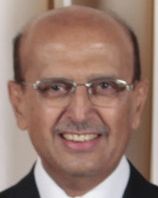
Qirbi |
Qirbi, Abu Bakr al- (b. 1942), foreign minister of Yemen (2001-14).
Qizilbash, (Nawab) Muzaffar Ali Khan (b. Dec. 25, 1908, Lahore, India [now in Pakistan] - d. Sept. 24, 1982), chief minister of West Pakistan (1958) and finance minister of Pakistan (1969-71). He was also Pakistani minister of industry (1957-58), commerce (1957-58), and parliamentary affairs (1957-58).
Quadra (y Rui Lugo), (José) Vicente (de la) (b. July 25, 1812, Granada [now in Nicaragua] - d. Dec. 10, 1894), president of Nicaragua (1871-75).
Quadra-Salcedo Fernández del Castillo, Tomás de la (b. Jan. 2, 1946, Madrid, Spain), justice minister of Spain (1991-93). He was also minister of territorial administration (1982-85) and president of the Council of State (1985-91).
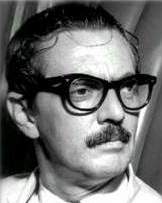
Quadros |
Quadros, Jânio da Silva (b. Jan. 25, 1917, Campo Grande, Mato Grosso, Brazil - d. Feb. 16, 1992, São Paulo, Brazil), president of Brazil (1961). He entered politics in 1945. After he was elected to the São Paulo city council (1947), he successfully campaigned for state deputy of São Paulo (1951); there he first campaigned with a broom as a symbol of his pledge to "sweep out corruption." He was an efficient mayor of the city (1953-54, 1955) and governor of the state (1955-59) of São Paulo. In his campaigns he affected the image of a commoner with a rumpled appearance. A favourite ploy was to pull a sandwich from his pocket while delivering a speech and then apologize, explaining he had not had lunch. In 1960 he became the presidential candidate of the Democratic National Union and won an overwhelming electoral victory. As president, besides banning bikinis and cockfighting, he sought to distance Brazil from U.S. influence, reestablishing diplomatic relations with the Soviet Union, supporting Fidel Castro's Cuba, and decorating Latin American guerrilla leader Che Guevara. After seven months in office he suddenly resigned, enigmatically citing the "occult forces" conspiring against him. It was believed that he had intended to return to office with expanded powers after being coaxed back into office by Congress, but his resignation was accepted, and power passed to the vice president, João Goulart, who was overthrown by the military in 1964. In 1968, Quadros was stripped of his political rights and banished to a town on the Bolivian border. After receiving amnesty in 1980, he returned to São Paulo, where he unsuccessfully ran for governor for the small Brazilian Labour Party in 1982. He later served again as mayor of São Paulo (1986-88) before ill health forced him to retire from politics.
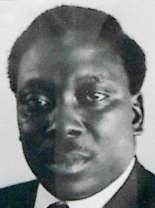
Quaison-Sackey |
Quaison-Sackey, Alex(ander) (b. Aug. 9, 1924, Winneba, Gold Coast [now Ghana] - d. Dec. 21, 1992, Accra, Ghana), president of the UN General Assembly (1964-65) and foreign minister of Ghana (1965-66). He was permanent representative to the UN (1959-65) and ambassador to Cuba (1961-65), Mexico (1962-64), and the United States (1978-80).
Quandt, Bernhard (b. April 14, 1903, Rostock, Mecklenburg-Schwerin [now in Mecklenburg-Vorpommern], Germany - d. Aug. 2, 1999, Schwerin, Mecklenburg-Vorpommern, Germany), minister-president of Mecklenburg (1951-52) and first secretary of the Socialist Unity Party of Schwerin (1952-74).
Quaraim, Pedro Rodrigues Fernandes Chaves, barão de (b. April 27, 1810, Porto Alegre, Rio Grande do Sul, Brazil - d. June 23, 1866, Pisa, Italy), president of Paraíba (1841-43); brother of Antonio Rodrigues Fernandes Braga. He was also chargé d'affaires in Uruguay (1837-38) and the United States (1840-41). He was made baron in 1855.
Quarles, John R(hodes), Jr. (b. April 26, 1935, Boston, Mass. - d. Oct. 29, 2012, Warrenton, Va.), acting administrator of the U.S. Environmental Protection Agency (1977).
Quarles van Ufford, Cypriaan Gerard Carel (b. Dec. 3, 1891, Bennekom, Gelderland, Netherlands - d. Feb. 4, 1985, Leusden, Utrecht, Netherlands), queen's commissioner of Gelderland (1946-57). He was also mayor of Apeldoorn (1934-41, 1945-46).
Quarles van Ufford, Johan Willem (b. April 7, 1882, Loosduinen, Zuid-Holland, Netherlands - d. Dec. 10, 1951, Domburg, Zeeland, Netherlands), queen's commissioner of Zeeland (1921-40, 1945-47).
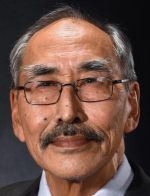
Quassa |
Quassa, Paul (Aarulaaq) (b. Jan. 12, 1952, Maniittuq, near Igloolik, N.W.T. [now in Nunavut]), premier of Nunavut (2017-18).
Quast, Jan Frederik (b. Nov. 13, 1875, Curaçao - d. Nov. 1, 1953, Curaçao), administrator of Aruba (1920-28).
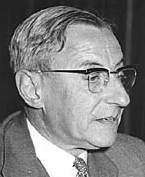
de Quay |
Quay, Jan Eduard de (b. Aug. 26, 1901, 's-Hertogenbosch, Noord-Brabant, Netherlands - d. July 4, 1985, Beers, Noord-Brabant), prime minister of the Netherlands (1959-63). He began his political career during World War II when in 1940, under the German occupation, he helped form the Netherlands Union. The main objective of this short-lived movement was to prevent the formation of a Dutch National Socialist government, even if some cooperation with the occupying power was needed to achieve that end. However, the movement was banned by the Germans in 1941, and de Quay was imprisoned during 1942-43. In 1945 he became minister of war in the postwar interim government and then queen's commissioner (governor) of Noord-Brabant (1946-59). As prime minister following the 1959 election, he presided over a coalition of his own Catholic People's Party with Liberals, Anti-Revolutionaries, and Christian-Historicals, with the Socialists in opposition. It was a period that was marked by conflict with Indonesia over the future of Netherlands New Guinea and that ended with the territory's incorporation into Indonesia as Irian Barat (now Irian Jaya). De Quay withdrew from politics in 1969.
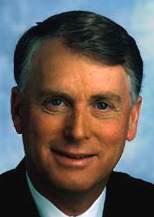
D. Quayle |
Quayle, Dan, byname of James Danforth Quayle (b. Feb. 4, 1947, Indianapolis, Ind.), vice president of the United States (1989-93). A Republican, he served in the U.S. House of Representatives (1977-81), his first election being a surprising victory over an eight-term incumbent Democrat. Elected to the U.S. Senate in 1980, defeating three-term incumbent Birch Bayh with much evangelical Protestant support, he co-sponsored the Job Training Partnership Act of 1982 and was chairman of a committee on the Senate's organization. He was easily reelected in 1986. At the Republican national convention in New Orleans, La., on Aug. 16, 1988, George Bush surprisingly selected the rather obscure Quayle to be the vice-presidential nominee. Affable and youthfully handsome, Quayle had no enemies and was on good terms with Republicans who did not regard Bush as a true conservative. However, Quayle impressed many as inexperienced, intellectually shallow, and a beneficiary of help from powerful relatives. Nominated by acclamation of the convention on August 18, he then was confronted with reports that a friend of his family had helped him get into the Indiana National Guard in 1969, when he otherwise might have had to serve in Vietnam. Quayle defended his Guard service and essentially treated the matter as a non-issue, and interest in it waned. On November 8 Bush and Quayle got 54% of the vote, but a later Gallup Poll indicated that 4% of those voting had voted against that ticket because of Quayle. His various verbal flubs (like his misspelling the word potato[e] in a student spelling bee) provoked much ridicule. Renominated in 1992, he focused on "traditional family values," but the Bush-Quayle ticket was defeated by Bill Clinton and Al Gore.
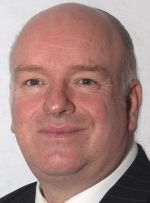
H. Quayle |
Quayle, (Robert) Howard (b. 1967?, Douglas, Isle of Man), chief minister of the Isle of Man (2016-21).
Quéau de Quinssy, Jean-Baptiste (b. 1748, Paris, France - d. July 10, 1827), governor (1793-1810) and acting commissioner (1810-11) of Seychelles.

Queffelec |
Queffelec, Thierry (b. Aug. 27, 1962, Thionville, Moselle, France), administrator-superior of Wallis and Futuna (2019-20) and prefect of French Guiana (2020- ).
Queiroga, Bernardino José de (b. July 14, 1800, Vila do Príncipe [now Serro], Minas Gerais, Brazil - d. 1866, Serro), president of Minas Gerais (1848).
Queirós, Tomé José de Barros (b. Feb. 2, 1872, Quintãs, Ílhavo, Portugal - d. May 5, 1926, Lisbon, Portugal), finance minister (1915, 1921) and prime minister (1921) of Portugal.
Queiroz, Ademar de (b. Nov. 22, 1899, Rio de Janeiro, Brazil - d. June 26, 1984, Rio de Janeiro), war minister of Brazil (1966-67). He was also president of Petrobras (1964-66).
Queiroz, Agnelo (dos) Santos, Filho (b. Nov. 9, 1958, Itapetinga, Bahia, Brazil), governor of Distrito Federal (2011-15). He was also Brazilian minister of sports (2003-06).
Queiroz, Alberto Andrade de (b. June 22, 1894, Benevides, Pará, Brazil - d. Feb. 15, 1957, Rio de Janeiro, Brazil), acting finance minister of Brazil (1952).
Queiroz, Djenal Tavares de (b. May 12, 1916, Frei Paulo, Sergipe, Brazil - d. July 20, 1997, Aracaju, Sergipe), acting governor of Sergipe (1982-83).
Queiroz, Francisco Antonio de Souza, Filho (b. July 22, 1834, São Paulo, Brazil - d. July 31, 1917, São Paulo), acting president of São Paulo (1885, 1889); son of Francisco Antonio de Souza Queiroz, barão de Souza Queiroz.
Queiroz, José Clarindo de (b. Jan. 22, 1841, Fortaleza, Brazil - d. Dec. 28, 1893, Rio de Janeiro, Brazil), president of Amazonas (1879-80) and governor of Ceará (1891-92).
Queluz, João Severiano Maciel da Costa, (visconde e) marquês de (b. Dec. 27, 1769, Mariana, Minas Gerais, Brazil - d. Nov. 19, 1833, Rio de Janeiro, Brazil), Portuguese governor of French Guiana (1809-17) and principal minister (1823-24) and foreign and finance minister (1827) of Brazil. He was also president of Bahia (1825-27). He was made viscount in 1824 and marquess in 1826.
Quércia, Orestes (b. Aug. 18, 1938, Pedregulho, São Paulo, Brazil - d. Dec. 24, 2010, São Paulo, Brazil), governor of São Paulo (1987-91). He was also mayor of Campinas (1969-73) and a minor presidential candidate (1994).
Quesada Larrea, José (b. March 8, 1898, Trujillo, Peru - d. Jan. 21, 1961, Lima, Peru), Peruvian politician. He was a presidential candidate (1939) and ambassador to Argentina (1947-48).
Quesnel, Paul Achille Michel (b. July 14, 1871 - d. July 6, 1945), administrator of Kwangchowan (1923-25).
Questiaux, Nicole (Françoise), née Valayer (b. Dec. 19, 1930, Nantes, France), French politician. In 1955 she joined the Conseil d'État, where in 1963 she was appointed government commissioner to deal with disputes, the first woman to hold such a post. She was already a specialist in social affairs and had contributed to several works on the subject. Georges Dayan, an old friend and mentor of François Mitterrand, allegedly introduced Questiaux to the Convention des Institutions Républicaines, which was a meeting place for many supporters of the future president. In 1970 Questiaux chaired the national delegation for Socialist unity, which brought together Socialists, members of the Convention, and other representative figures with the aim of uniting Socialist forces in France. This undertaking led to the Congress of Socialist Unity in June 1971. A member of the leadership committee of the Socialist Party (PS), she was appointed national delegate to the European Communities in February 1975 but resigned six months later. In 1979 she joined the left-wing group within the PS. As minister of national solidarity (1981-82) she was the highest ranking of the six women members of the PS government formed in May 1981 after the election of Mitterrand. The Ministry of National Solidarity, one of three new ministries set up by Mitterrand's administration, combined responsibility for social security and welfare, immigrant affairs, and the broad direction of social policy. One of her major problems was the growing deficit in the social security budget.
Quetá, Adelino Mano (b. June 23, 1941, Mansoa, Portuguese Guinea [now Guinea-Bissau] - d. June 14, 2014, Bissau, Guinea-Bissau), foreign minister (2009-11) and justice minister (2011-12) of Guinea-Bissau. He was also attorney general (1985), permanent representative to the United Nations (1995-96), ambassador to Taiwan (1997-98), Portugal (1999-2000), Morocco, Italy, and Spain, and a minor presidential candidate (2005).

Queuille |
Queuille, Henri (Antoine) (b. March 31, 1884, Neuvic, Corrèze, France - d. June 15, 1970, Paris, France), prime minister of France (1948-49, 1950, 1951). He was also minister of agriculture (1924-25, 1926-28, 1930, 1932-34, 1938-40), public health (1930-31, 1934-35), posts, telegraphs, and telephones (1932), public works (1937-38, 1948), supply (1940), tourism (1948), finance (1948-49), and interior (1950-51), a minister of state (1948, 1951-52), and a deputy prime minister (1949-50, 1952-54).
Quevedo (Moscoso), Antonio J(osé) (b. April 8, 1900, Portoviejo, Ecuador - d. Jan. 5, 1987, Quito, Ecuador), foreign minister of Ecuador (1932-33). He was also minister to France, the United Kingdom, and Switzerland (1937-39) and Peru (1940-41) and permanent representative to the United Nations (1950-52).
Quezada Acharán, Armando (b. April 3, 1873, Los Ángeles, Chile - d. April 3, 1936, Viña del Mar, Chile), finance minister (1916, 1917) and interior minister (1918-19) of Chile. He was also minister to France (1922-28) and rector of the University of Chile (1929-30).
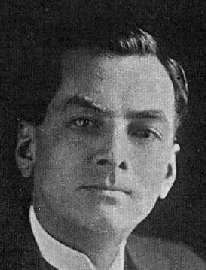
Quezon |
Quezon (Antonio y Molina), Manuel L(uis) (b. Aug. 19, 1878, Baler, Tayabas [now Quezon] province, Philippines - d. Aug. 1, 1944, Saranac Lake, N.Y.), president of the Philippines (1935-44). In 1899 he joined the struggle for independence led by Emilio Aguinaldo, who surrendered in 1901. He was imprisoned for six months and became convinced that the only way to independence was through cooperation with the United States. He was elected governor of Tayabas province in 1905 and a representative to the newly established Philippine Assembly in 1907. In 1909 he was appointed one of two resident commissioners for the Philippines, entitled to speak, but not vote, in the U.S. House of Representatives; he played a major role in obtaining Congress' passage of the Jones Act (1916), which gave the Philippines greater autonomy and promised eventual independence, without giving a specific date. He resigned as commissioner and was elected to the newly formed Philippine Senate in 1916, serving as its president until 1935. In 1922 he replaced Sergio Osmeña as leader of the Nacionalista Party. He fought for passage of the Tydings-McDuffie Act (1934), which provided for full independence 10 years after the adoption of a constitution and the establishment of a Commonwealth of the Philippines as a forerunner of an independent republic. He was elected president of the new commonwealth in 1935 and reelected in 1941. He sought to spur economic development, promote social justice, and fight corruption, and began the construction of a new national capital (later known as Quezon City). When Japan invaded and occupied the Philippines in 1942, he escaped to the United States, where he headed a government in exile. He died before full Philippine independence was established.
Quiel Murcia, Isbeth Lisbeth, Panamanian diplomat. She was chargé d'affaires at the United Nations (2019-20).
Quijandría Salmón, Jaime (b. 1943, Lima, Peru - d. Dec. 30, 2013, Lima), economy and finance minister of Peru (2003-04). He was also minister of energy and mines (2001-03, 2004). His brother Álvaro Quijandría Salmón (b. April 25, 1941, Lima - d. May 17, 2005, Lima) was agriculture minister (2001-03).
Quijano (Ordóñez de Lara), Manuel de Jesús (b. Oct. 24, 1813, Lacatunga, New Granada [now in Ecuador] - d. Oct. 3, 1880, Popayán, Colombia), foreign minister of Colombia (1863-64, 1866).
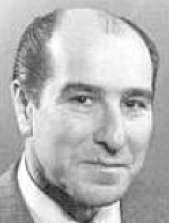
Quijano |
Quijano, Raúl (Alberto José) (b. Dec. 13, 1923, Santa Fe, Argentina - d. April 14, 2006), foreign minister of Argentina (1976). He was also ambassador to Paraguay (1984-89).
Quijano Wallis, José María (b. July 20, 1847, Popayán, New Granada [now Colombia] - d. March 23, 1923, Bogotá, Colombia), treasury minister (1876-78) and foreign minister (1882) of Colombia; son of Manuel de Jesús Quijano. He was also chargé d'affaires in Italy (1878-80) and minister to Switzerland (1906-18) and Italy (1918-19).
Quilès, Paul (b. Jan. 27, 1942, Saint-Denis-du-Sig [now Sig], Algeria - d. Sept. 24, 2021, Paris, France), French defense minister (1985-86) and interior and public security minister (1992-93). He was also minister of town planning and housing (1983-85), transports (1984-85, 1991-92), posts and telecommunications (1988-91), space (1988-92), and equipment and housing (1991-92).
Quim, Antonio José (b. June 10, 1800, São Luís, Maranhão, Brazil - d. March 27, 1877), acting president of Maranhão (1834, 1834-35).
Químper (Caballero), José María (b. Sept. 18, 1830, Camaná, Peru - d. June 4, 1902, Lima, Peru), interior, police, and public works minister (1865-67) and finance and commerce minister (1879) of Peru. He was also president of the Constituent Congress (1867).
Quinan, Onofre (b. Oct. 29, 1926, Vianópolis, Goiás, Brazil - d. Jan. 14, 1998, Brasília, Brazil), acting governor of Goiás (1986-87).
Quincy, Josiah (b. Feb. 4, 1772, Boston, Massachusetts - d. July 1, 1864, Quincy, Mass.), mayor of Boston (1823-28).
Quincy, Josiah (b. Oct. 15, 1859, Quincy, Mass. - d. Sept. 8, 1919, Boston, Mass.), mayor of Boston (1895-99); grandson of Josiah Quincy, Jr.
Quincy, Josiah, Jr. (b. Jan. 17, 1802, Boston, Mass. - d. Nov. 2, 1882, Quincy, Mass.), mayor of Boston (1845-48); son of Josiah Quincy (1772-1864).
Quinim Pholsena (b. Nov. 18, 1915, Pakse, Champasak [now in Laos] - d. [assassinated] April 1, 1963, Vientiane, Laos), foreign minister of Laos (1962-63). He was also minister of interior (1960) and information (1960).
Quinlan, Gary (Francis) (b. Feb. 9, 1951), Australian diplomat. He was high commissioner to Singapore (2001-05), permanent representative to the United Nations (2009-15), and ambassador to Indonesia (2018-21).
Quinlan, Peter (Damien) (b. June 16, 1970, Perth, W.Aus.), acting governor of Western Australia (2022). He has been chief justice (2018- ) and lieutenant governor (2019- ).
Quinn, Pat(rick Joseph) (b. Dec. 16, 1948, Hinsdale, Ill.), governor of Illinois (2009-15).
Quinn, Ruairí, Irish Ruairí Ó Cuinn (b. April 2, 1946, Dublin, Ireland), finance minister of Ireland (1994-97). He was also minister of labour (1983-87), public service (1986-87), enterprise and employment (1993-94), and education and skills (2011-14) and leader of the Labour Party (1997-2002).
Quiñones, José Luis, justice and education minister of Peru (1865).
Quiñónez (Abarca), Aníbal (Enrique) (b. Jan. 7, 1950, Tegucigalpa, Honduras), foreign minister of Honduras (2003). He was ambassador to Uruguay and Paraguay (1981-83) and to Japan (1985-94).
Quiñónez Amezquita, Mario Rafael (b. June 4, 1933, Quetzaltenango, Guatemala), foreign minister of Guatemala (1986-87). He was also permanent representative to the United Nations (1982-84).
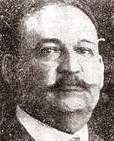
Quiñónez M. |
Quiñónez Molina, Alfonso (b. Jan. 11, 1874, Suchitoto, El Salvador - d. May 22, 1950, San Salvador, El Salvador), president (1914-15 [provisional], 1918-19 [acting], 1923-27) and vice president (1915-18, 1919-23) of El Salvador.
Quintal, Abraham Blatchly (b. Jan. 31, 1827, Pitcairn Island - d. Sept. 20, 1910, Norfolk Island), chief magistrate of Pitcairn Island (1852); son of Edward Quintal; brother of William Quintal.
Quintal, Arthur, I (b. May 6, 1795, Pitcairn Island - d. Nov. 19, 1872, Norfolk Island), chief magistrate of Pitcairn Island (1840-41).
Quintal, Arthur, II (b. 1816, Pitcairn Island - d. Aug. 20, 1902, Norfolk Island), chief magistrate of Pitcairn Island (1845-46, 1850, 1854) and Norfolk Island (1862-65, 1885); son of Arthur Quintal I.
Quintal, Edward (b. 1800, Pitcairn Island - d. Sept. 8, 1841, Pitcairn Island), chief magistrate of Pitcairn Island (1838-39); half-brother of Arthur Quintal I.
Quintal, William (b. 1817, Pitcairn Island - d. July 6, 1905, Norfolk Island), chief magistrate of Norfolk Island (1866, 1872-73); son of Edward Quintal; brother of Abraham Blatchly Quintal.
Quintana (Elías), Ismael de la (b. June 15, 1849, Ica, Peru - d. Nov. 9, 1925, Lima, Peru), finance minister of Peru (1890-91); nephew of Domingo Elías; cousin of Carlos M. Elías.
Quintana, Juan de Dios (de la) (b. Ica, Peru - d. ...), interior minister of Peru (1903-04).
Quintana (y Sáenz de la Gaona), Manuel (Pedro de la) (b. Oct. 19, 1835, Buenos Aires, Argentina - d. March 12, 1906, Buenos Aires), president of Argentina (1904-06). He was also interior minister (1892, 1893-94).
Quintana Burgos, Alfonso (b. Dec. 31, 1891, Chillán, Chile - d. Aug. 27, 1972, Santiago, Chile), interior minister of Chile (1944-45, 1948, 1951-52). He was also agriculture minister (1940-41, 1943-44), ambassador to Argentina (1945-48), and intendant of Santiago province (1949-50).
Quintana Villanueva, Julio C(ésar) (b. March 3, 1908, León, Nicaragua - d. 2004), interior minister (1956-62) and foreign minister (1977-79) of Nicaragua. He was also mayor of Managua (1953) and ambassador to France (1968-75) and Belgium (1970-75).
Quintanilla (Quiroga), Carlos (b. Jan. 22, 1888, Cochabamba, Bolivia - d. June 8, 1964, Cochabamba), provisional president of Bolivia (1939-40). He was also ambassador to the Vatican (1940-41).

Quintanilla S. |
Quintanilla Schmidt, Carlos (b. Aug. 5, 1953, San Miguel, El Salvador), vice president of El Salvador (1999-2004).
Quintão, Geraldo (Magela da Cruz) (b. July 1, 1935, Caeté, Minas Gerais, Brazil), defense minister of Brazil (2000-03). He was also attorney-general (1993-2000).
Quintela, Inácio da Costa (b. 1763, Lisbon, Portugal - d. Dec. 6, 1838, Lisbon), principal minister of Brazil (1821). He was also navy minister of Portugal (1826).
Quintero Calderón, Guillermo (b. Feb. 3, 1832, Gamarra [now Puerto Nacional], Magdalena, New Granada [now Colombia] - d. Feb. 14, 1919, Bogotá, Colombia), interior minister (1900-02) and acting war and navy minister (1900) of Colombia. He was also governor of Santander (1888-90) and a presidential candidate (1910).
Quinteros, Alfonso, interior, justice, and immigration minister of Bolivia (1944).
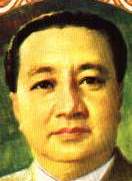
Quirino |
Quirino (y Rivera), Elpidio (b. Nov. 16, 1890, Vigan, Ilocos Sur province, Philippines - d. Feb. 28, 1956, Novaliches, Quezon City, Philippines), president of the Philippines (1948-53). He was elected to the Philippine House of Representatives (1919-25) and Senate (1925-31). In 1934 he was a member of the Philippine independence mission to Washington, D.C., which secured the passage in Congress of the Tydings-McDuffie Act under which the Philippines achieved independence in 1946. In 1934 he was also elected to the convention that drafted a constitution for the new Philippine Commonwealth. He served as secretary of finance (1935-36) and of the interior (1936-38) in the commonwealth government. During the World War II Japanese occupation (1942-45), he was captured and imprisoned. After the war, he again became secretary of finance (1946) and then served as foreign secretary and vice president (1946-48) under the first president of the independent Philippines, Manuel Roxas. When Roxas died in 1948, Quirino succeeded to the presidency; he was also his own foreign secretary until 1950. In 1949 he was elected to a four-year term on the Liberal Party ticket, defeating the Nacionalista candidate. Quirino's presidency was marked by general economic gains but basic social problems remained unsolved and his administration was tainted by graft and corruption. His administration was threatened by the Communist-led Hukbalahap (Huk) movement, which by 1950 had gained control over a considerable portion of Luzon. Ramon Magsaysay, who as secretary of national defense was largely successful in eliminating the insurgency, broke with Quirino on the issue of corruption, campaigned for clean elections, and as the Nacionalista candidate defeated Quirino in the presidential election of 1953. Subsequently, Quirino retired from public life.
Quirno Costa, Norberto (Camilo) (b. July 18, 1844, Buenos Aires, Argentina - d. March 2, 1915, San Fernando, Buenos Aires province), foreign minister (1886-89, 1893), interior minister (1896-97, 1906), and vice president (1898-1904) of Argentina. He was also minister to Chile (1892-96).
Quiroga, Adolfo (b. Aug. 9, 1837, Lima, Peru - d. Aug. 16, 1894, Lima), justice and education minister (1879) and acting foreign minister (1879) of Peru.
Quiroga Chinchilla, José Antonio (b. June 13, 1898, Cochabamba, Bolivia - d. Oct. 27, 1968, Cochabamba), Bolivian minister of war and colonization (1933-34) and interior and justice (1934).
Quiroga Gómez, Germán (b. 1951, La Paz, Bolivia - d. July 22, 2018), interior minister of Bolivia (1993-95). He was also prefect of La Paz (1996-97).
Quiroga Matos, Jaime (A.), finance minister of Bolivia (1973-74). He was also ambassador to the United Kingdom (1998-2001).
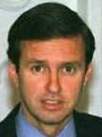
Quiroga R. |
Quiroga Ramírez, Jorge (Fernando), byname Tuto Quiroga (b. May 5, 1960, Cochabamba, Bolivia), finance minister (1992), vice president (1997-2001), and president (2001-02) of Bolivia. He was a presidential candidate in 2005 and 2014.
Quiroga Suárez, José (b. July 4, 1920, Petín, Orense province, Galicia, Spain - d. Oct. 18, 2006, Valdeorras, Orense province), president of the Xunta of Galicia (1979-82).
Quiroga Terán, Oscar, interior and justice minister of Bolivia (1964-66). He was also ambassador to Spain (1966-69).
Quirós (y Ampudia), Francisco (b. 1798, Cerro de Pasco, Peru - d. Jan. 11, 1862, Lima, Peru), foreign (and education) minister of Peru (1855-56). He was also prefect of Junín (1833-35).
Quirós Segura, Juan Bautista (b. Jan. 18, 1853, San Juan del Murciélago [now San Juan de Tibás], Costa Rica - d. Nov. 7, 1934, San José, Costa Rica), acting president of Costa Rica (1919). He was also minister of war and navy (1894-98, 1899-1901, 1919), finance and trade (1898-1901), and development (1917).
Quiróz, Rafael, finance minister of Peru (1892-93, 1900).
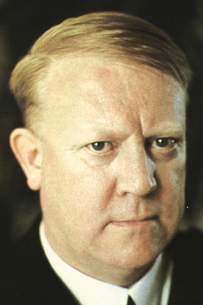
Quisling |
Quisling, Vidkun (Abraham Lauritz Jonssøn) (b. July 18, 1887, Fyresdal, Norway - d. Oct. 24, 1945, Akershus Fortress, Oslo, Norway), Norwegian leader. He graduated from the Military Academy in 1911 and served as military attaché in Petrograd (St. Petersburg; 1918-19) and Helsinki (1919-21). Later he assisted the famous Arctic explorer and humanitarian Fridtjof Nansen in his relief work in Russia and worked there for the League of Nations. In the absence of diplomatic relations between Britain and the Soviet Union, he represented British interests at the Norwegian legation in Moscow (1927-29). Returning to Norway in 1929, he joined the Agrarian Party and was made defense minister in an Agrarian minority government (1931-33), gaining notoriety for repressing a strike by hydroelectrical workers. In 1933 he founded his own party, the fascist Nasjonal Samling (National Union), which stood for suppression of Communism and unionism, but it never gained a single seat in the Storting (parliament). At a meeting with Adolf Hitler in December 1939, he urged a German occupation of Norway; after assisting the German invasion of April 1940, he proclaimed himself head of the government. His regime so incensed the Norwegians that it collapsed within a week, but the Germans were unable to find a better substitute, and he was named "minister president" in February 1942. His attempts to nazify the Norwegian church, schools, and youth aroused fervent opposition. He deported nearly 1,000 Jews to die in German concentration camps. After the surrender of the German forces in Norway in May 1945, he was arrested, found guilty of treason and other crimes, sentenced to death on September 10, and executed by firing squad. His collaboration with the Germans established his surname as a synonym for "traitor."
Quispe Correa, (Jorge) Alfredo (b. April 13, 1936, Lima, Peru - d. Nov. 15, 2010), justice minister of Peru (1997-99).
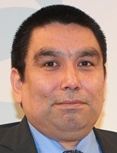
Qujaukitsoq |
Qujaukitsoq, Vittus (b. Oct. 5, 1971, Qaanaaq, Greenland), finance minister (2013-14, 2018-21), interior minister (2013-14), and foreign minister (2014-17) of Greenland. He was also minister of raw materials, labour market, constitutional affairs, and independence (2018).
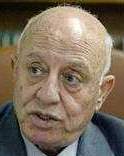
Qureia |
Qureia, Ahmed (Ali), also spelled Qurei or Qurie, byname Abu Ala, Arabic Ahmad `Ali Muhammad Quriy`, or Abu `Ala´ (b. 1937, Abu Dis, near Jerusalem, Palestine - d. Feb. 22, 2023, Ramallah, Palestine), prime minister of the Palestinian Authority (2003-05, 2005-06). He joined Yasir Arafat's mainstream Fatah faction of the Palestine Liberation Organization at the end of the 1960s. With the death of other senior PLO leaders, he gradually gained more influence until he was elected a member of the Fatah central committee in 1989. He was one of the architects of the Oslo peace accords signed with Israel in 1993, which led to Palestinian autonomy in parts of the occupied territories. He became minister of economy and trade (1994-96) and helped design the Palestinian Economic Council for Development and Reconstruction. After the 1996 elections he became speaker of the Palestinian Legislative Council. In 2003 he became the second prime minister of the Palestinian Authority, after Mahmoud Abbas resigned in a power struggle with Arafat. Qureia himself was locked in a lengthy battle with Arafat over who should take over the key Interior Ministry post. He remained prime minister after Arafat's death in 2004, until the 2006 legislative elections in which Fatah was defeated.
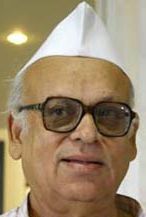
A. Qureshi | 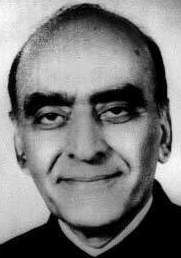
Moeen Qureshi | 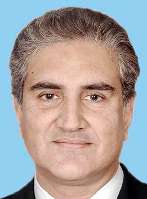
S.M. Qureshi |
Qureshi, Aziz (b. Feb. 3, 1940, Bhopal, India), governor of Uttarakhand (2012-15), Uttar Pradesh (2014), and Mizoram (2015).
Qureshi, Makhdoom (Muhammad Sajjad Hussain) (d. Jan. 23, 1998, Lahore, Pakistan), governor of Punjab (Pakistan) (1985-88).
Qureshi, Moeen(uddin Ahmad) (b. June 26, 1930, Lahore, India [now in Pakistan] - d. Nov. 22, 2016, Washington, D.C.), interim prime minister of Pakistan (1993).
Qureshi, Mohammed Shafi (b. Nov. 24, 1929, Srinagar, Jammu and Kashmir, India - d. Aug. 28, 2016, New Delhi, India), governor of Bihar (1991-93), Madhya Pradesh (1993-98), and Uttar Pradesh (1996, 1998). He was also Indian minister of tourism and civil aviation (1979-80).
Qureshi, (Makhdoom) Shah Mehmood (b. June 22, 1956, Murree, Pakistan), foreign minister of Pakistan (2008-11, 2018-22); son of Makhdoom Qureshi.
Qvam, Ole (Anton) (b. Aug. 5, 1834, Bolsøy, Romsdals amt [now Møre og Romsdal fylke], Norway - d. July 8, 1904, Gjevran, Nordre Trondhjems amt [now in Trøndelag fylke], Norway), justice minister (1891-93, 1898-99, 1900-02) and interior minister (1899-1900) of Norway and governor of Nordre Trondhjems amt (1894-98). He was also chairman of the Liberal Party (1884-89, 1894-96), minister of auditing (1900), and minister in Stockholm (1902-03).



























